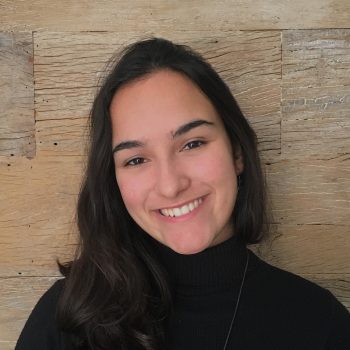Livingstone Undergraduate Research Award in STEM
Livingstone Undergraduate Research Award in STEM
Thais Costa Macedo De Arruda

Unpacking Social Impairment in those with Opioid Use Disorder: Linking Impulsivity, Childhood Trauma, and the Prefrontal Cortex
View Thais’ project online
My project was focused on understanding what is behind the social functioning challenges that those with a history of opioid use disorder face. We found that patients in recovery from OUD who have social challenges are more impulsive and they activate more of their PFC when trying to regulate their responses. We also found that childhood trauma moderates this relationship, such that those with more exposure to adversity during childhood have increased impulsivity and decreased social functioning.
What is your major and expected year of graduation?
I am a senior neuroscience major in the college of liberal arts, with minors in public health and Italian. I will be graduating in December 2024.
What inspired you to pursue your project?
What inspired me to pursue this project was a previous work from my mentor that identified cognitive and behavior challenges in those with opioid use disorder. This made me wonder if these were also related to social experiences. We all know how crucial it is to be social and to interact with others, so I wondered how all those pieces fitted together, and how the brain might also play a key part in this. In general, it was a desire I had to combine my understanding of the functionality of the brain with the real health issues that I was observing through research and through my personal experience.
What does winning this award mean to you?
Winning this award is incredibly important to me. As an international student, I never thought research was something possible for me. I never envisioned myself learning how to code, or performing different statistical tests, let alone achieving recognition for a full research project I spearheaded. It’s truly an honor beyond words and represents the realization of a dream I never thought attainable. I am incredibly thankful to all of my research team, especially my mentor Dr. Laura Sinko, who never failed to believe in me and encourage my research endeavors. Seeing my name on that scientific manuscript is truly a dream come true.
How did the Libraries support your research?
The Temple University Libraries were instrumental in completing my research project. The access to a variety of primary resources facilitated a thorough literature review and selecting the appropriate theoretical framework for my research. Additionally, the REDcap courses offered by Will Dean enhanced my proficiency with data management and understanding how to navigate stored data, which was crucial to the development of the data analysis portion of my research. I also met with librarian Travis Nace, who provided me guidance in literature search and citation management strategies. This substantially streamlined my research process in general. Overall, the Libraries’ resources and expertise were crucial in completing my project and submitting it to a scientific journal.
Thais is an intelligent, self-motivated, and dedicated student researcher. Her passion for understanding the complex challenges faced by individuals recovering from trauma and opioid use disorder shines through in her research. Leveraging cutting-edge neuroimaging technology, Thais has uncovered novel insights into the neural mechanisms underlying social impairment in those recovering from opioid use disorder. Her findings underscore the need for personalized, trauma-informed interventions to compliment recovery treatment programs. Thais’ growth as a researcher is evident in her keen analytical skills, scientific writing prowess, and tireless advocacy for translating research into real-world impact. I am honored to have mentored such a brilliant, compassionate scientist who is undoubtedly destined for greatness in whatever future path she chooses.
—Laura Sinko, Assistant Professor, College of Public Health
This category covers research methods used in the fields of science, technology, engineering, and mathematics. For the sciences, submissions will include a review of the relevant literature and a description of experimental results obtained through the scientific method. Technology and engineering submissions may take the form of a technical report or design document.
This award is generously sponsored by John H. Livingstone, SBM ’49.
